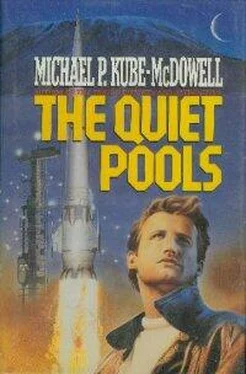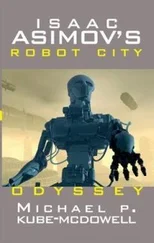One hundred sixty-three were known dead, and at least six hundred were missing, including the Detroit city manager, a noted poet, and three members of the Detroit Pistons basketball team. What’s more, officials feared that the collapse had burst thousands of containers of colloidized hazardous waste stored in the mine in the 1990s. The Archbishop of Detroit, with wages-of-sin solemnity, called it God’s warning to Sodom.
Death in the night, earthquakelike devastation, holiday-season tragedy, toxic poisons, missing celebrities, government neglect, holy vengeance—it was a news executive’s wet dream. Christopher watched the coverage with a rum-flavored bemusement, finding black humor in the absurdities of the event, the stupidities of the reporters.
Christopher’s mood had turned increasingly savage, cynical. It was already unpleasant sharing his mind with such thoughts, and promised to grow uglier still. He needed an escape from his escape. When it finally came, it was from a most unexpected source.
“Christopher, are you awake?” Lila asked. On the TV, dancers writhed to a backbeat.
“Sorry to say.”
“Daniel Keith is calling.”
He looked dumbly at his band. “My phone didn’t ring.”
“It’s a station call to the house, Christopher. Shall I put it up for you?”
Christopher uncrossed his legs and pulled himself closer to vertical. “Sure.”
Keith’s face came up in a box on the TV. “Hello, Chris.”
“Hello yourself.” He shook his head, mostly to clear it. “Surprise, surprise. After this morning—”
“Yeah. I didn’t want to be that short. But I couldn’t talk. I couldn’t even tell you that I couldn’t. Not till I could get out of the complex.”
“You home now?”
“No. Look, Chris, the hair on my neck is standing up just being on the line with you. There’s been a lot of talk around here the last day or two, very strange stuff, none of it official. I didn’t know how much of it to believe. I guess you told me. Your father was Jeremiah?”
“So I’m supposed to believe. I swear I didn’t know.”
Keith nodded. “I might be the only one in the center who’d believe that,” he said slowly.
“I need some answers, Daniel.”
“You want some wisdom? Don’t ask the questions.”
“My father left notes that have me confused. I have to know if what he believed was true.”
“Why?” It was a cautionary, challenging question. Why do you have to know? Are you sure you want to know ?
“So I can let go of it. So it’ll let go of me. Will you meet me somewhere?”
Keith frowned and looked away momentarily. “Are you coming back to Houston?”
“I can’t,” Christopher said. “Meet me in Portland. No, better, San Francisco.”
“I’ve got no reason to come west. And I need a reason. A good reason. There’s a limit to how much of a friend I can be to you now. I’m sorry. That’s just the fact.”
“I know. Where, then?”
Keith was silent for a time. “I think I’m going to go up to Chicago and visit my parents when we finally get cleared to leave. Nobody around here’s gotten their winter holiday yet.”
“When?”
“Not tomorrow. Probably not till Friday.”
“I’ll be there Friday. Call me.”
“I don’t know,” Keith said, shaking his head.
“Please, Daniel. An hour. Half an hour.”
“Why do you think I can help?” He almost sounded angry.
“I went out to watch the salmon at Bonneville Dam this morning.”
“Oh? Were they helping each other?”
“I need to know why it’s happening. I need to know why we’re doing what we’re doing.”
Keith looked cross, distracted.
“Will you talk to me?”
“I don’t know,” Keith said. His tone hardened the words to a no .
Christopher chose to ignore the subtext. “Friday in Chicago. I’ll call you.”
“No,” said Keith, shaking his head. “Don’t. Maybe I’ll call you. I have to think about it. Let’s leave it at that.”
There was nothing to be gained by pushing him. “All right. We’ll leave it at that.”
“Thank you.” Eyes lowered, Keith looked as though he were unhappy with himself. “I don’t know why I called you this time.”
“I’m glad you did.”
“Sure. Chris—”
“Still here.”
Keith did not look up. “If you’ve got nothing better to do, you might ask DIANNA about von Neumann machines.”
He signed off before Christopher could reply.
CHAPTER 28
—GCC—
“Sweet promises were made.”
After months of working on and with the Memphis hyper, it was hard to go back to DIANNA. The sluggish query engine, the restricted cross-citations, the lack of original source texts were all painfully obvious to Christopher. But he was reluctant to use his father’s specialty accounts, and besides, Keith had pointed him specifically in that direction.
The name of Johann von Neumann was one with which Christopher had at least a passing acquaintance. In fact, it was hard to pass through any sort of technical education and not brush up against the Hungarian savant at one or more points.
In quantum theory, there was Neumann algebra with its critical analytical tools—rings of operators and continuous geometry. In economics, political science, and military strategy, von Neumann’s game theory and minimax theorem still held center stage. In theoretical mathematics, there was the von Neumann who solved Hilbert’s fifth problem and offered a persuasive proof of the ergodic hypothesis.
In computer science, von Neumann was there at the stone knives and bearskins beginning, introducing stored programs and advancing logical design in the ENIAC era. In meteorology, he anticipated the greenhouse effect in his studies of planetary heat balance. And in the history of technology, there was “Johnny” of the Manhattan Project, designing implosion lenses and solving hydrodynamic problems for Fat Man, the first plutonium bomb.
But the lead which Keith had given Christopher pointed in a different direction, to a comparatively unheralded collection of papers published a decade after von Neumann’s death. Theory of Self-reproducing Automata was a speculation on a daunting engineering challenge—the design and construction of a “universal constructor.”
Von Neumann envisioned the universal constructor as an advanced cybernetic device capable of making any sort of artifact, including a copy of itself, from the specifications programmed within it and the raw materials found without. The pattern of cross-citations showed his influence on his contemporaries.
But the citations which interested Christopher were not from von Neumann’s century, but from Christopher’s own. Fifty years ago, as the elements which would lead to the construction of Tigris were starting to reach critical mass, a weak countermovement arose.
The amorphous opposition had no coordinating focus, no political center, no activist arm. All it had was a unifying argument—presented philosophically by some advocates, pragmatically by others. The first starships should be von Neumann machines, they argued. A crewed starship was too expensive, too complex, too premature, too risky. Send machines first— ship-sized robot probes which would pave the way for starships to follow, or even take their place entirely.
Some called for a few complex “prospector” probes, which could collect and relay information which could shape later decisions. Others wanted many expendable “pathfinder” probes, which could gauge the dangers of such a journey. The most ambitious proposed “caretaker” probes, which could oversee the terraforming of one planet while dispatching their clones to do the same for other worlds.
Читать дальше

![Nick Cracknell - The Quiet Apocalypse [= Island Zero]](/books/28041/nick-cracknell-the-quiet-apocalypse-island-zero-thumb.webp)










